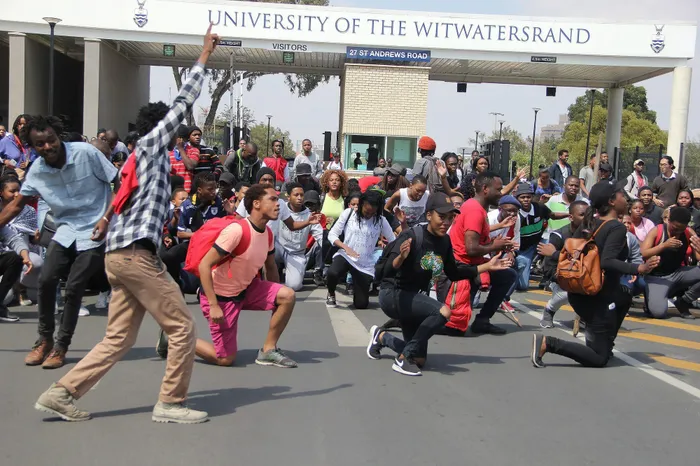
HARDSHIP: Wits University students protest after former higher education minister Blade Nzimande said there would be no fee increase for NSFAS beneficiaries in 2016. HARDSHIP: Wits University students protest after former higher education minister Blade Nzimande said there would be no fee increase for NSFAS beneficiaries in 2016.
WITS University law student Tshiamo Modise is still waiting for the National Student Financial Aid Scheme (NSFAS) to pay his allowance five months into the academic year.
Last year the 19-year-old found himself forced to sleep in the toilets because of the protracted delays by NSFAS to pay his fees.
“It’s not easy to attend classes knowing that you have debts for studies and accommodation. This is stress because everything counts, clothes, food and accommodation.”
Modise, a second-year BA Law student, said last year he was forced to travel to Wits from his home in Soshanguve, Tshwane, because he could not afford to pay accommodation around Joburg.
“During exams I had to sleep in the toilets because I had to be close to the library. I survived as though I was not a human being, because sometimes I had to study with an empty stomach. I was like an animal.
“I had to sacrifice myself because all I want is to get my qualification,” he said.
Modise owes R15000 for accommodation and R70000 in study fees from last year.
Last week, the South African Students’ Congress (Sasco) said more than 80% of first-time students at universities and TVET colleges had not received their NSFAS allowances.
This past week, students at Nelson Mandela University (NMU) in Port Elizabeth protested over the non-payment of allowances, as well as accommodation problems.
When contacted, NSFAS spokesperson Kagisho Mamabolo said he did not respond to questions. He only sent a media statement on the protests at NMU.
In December last year, former president Jacob Zuma announced that first-year university and TVET students from families with a combined income of R350000 a year would receive free education.
Second-year students or above were funded on the basis of a family income of up to R122000.
University of Johannesburg (UJ) spokesperson Herman Esterhuizen said payments had been made for a couple of months and that they were still waiting for the final payments.
Wits University spokesperson Shirona Patel said NSFAS had paid allowances that are “payable in terms of their (NSFAS) rules”.
Modise said: “Last year they (NSFAS) didn’t pay. The university gave me a chance to continue with my studies, but I don’t know what will happen when I complete my course.
“I might not graduate because I’ll be owing.”
He said the problem has spurred him on to work even harder.
“The situation is also making me stronger mentally because I realised that I must work on my own. I do some part-time jobs during the holidays to buy myself food. It’s tough because I still have to focus on my assignments,” he said.
Another student,who only identified himself as Kabelo, said he relies on his late father’s pension fund to attend his classes.
“On some days I have to go to campus without food because there isn’t much to go around at home. Classes are difficult for me.
“I lack concentration because this situation is depressing,” said Kabelo, a second-year BA student, who travels from Katlehong to Wits main campus in Braamfontein.
Kabelo owes more than R100 000 in academic fees. “Now I am afraid that my mother might run out of money to help me as she is using my father’s annuity, which is going to end soon,” he said.
Sasco acting general secretary Simphiwe Joja blamed lack of willingness and poor administration by NSFAS for the delays. Joja said this shows NSFAS does not take students seriously, adding that some students depend on the financial aid scheme to attend classes.
“We had a meeting with NSFAS on Tuesday and they promised to come up with a solution for this. But if they can’t find a solution then we are going to take it to the streets. We are also expecting the government to intervene since they promised free education to end poverty,” said Joja.
Peter Keetse, EFF Student Command leader at Wits University, said they were disturbed by the NSFAS’s failure to manage funds to assist students access to higher education.
Two weeks ago, Higher Education and Training Minister Naledi Pandor announced that the government would give more money to NSFAS, including an additional R7.1billion to fund bursaries for poor and “missing middle” students.
“Additional government funding of R7.1bn in 2018 has been allocated to fund bursaries for children of poor and working-class families entering universities and TVET colleges, with R4.5bn set aside for qualifying university students and R2.6bn for TVET college students,” Pandor said.
